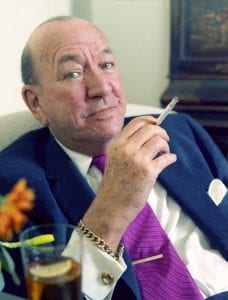A recent classic from Broadway is available for free streaming from PBS now through August 31, 2020.
Present Laughter, written by Noel Coward and starring Kevin Kline, is available for free streaming at:
The play was filmed during a live performance on Broadway in 2017 and was broadcast on PBS on July 31, 2020. The performance got stellar reviews during its run on Broadway.
Present Laughter was written by Coward in 1939 but not produced until 1942 because the Second World War began while it was in rehearsal. The title is drawn from a song in Shakespeare’s Twelfth Night that urges carpe diem (“present mirth hath present laughter”).
The plot depicts a few days in the life of a successful and self-obsessed actor – based on Coward himself – as he prepares to travel for a touring commitment abroad. Coward starred in the play during the original run in 1942. Subsequent productions have featured actors such as Albert Finney, Peter O’Toole, Donald Sinden, Ian McKellen and Simon Callow, and in the US Clifton Webb, Douglas Fairbanks Jr., George C. Scott, Frank Langella and Kline.*
Here is an introduction to the show from the PBS Great Performances Youtube Channel
The 2017 play got 5 of 5 stars from New York Theatre Guide.
“If you assume that Kevin Kline is perfect for Noel Coward, you assume correctly — and then some. By talent, training and temperament, Kline is a natural. In Present Laughter, he dazzles as the stage idol just a teensy bit past his prime in a delightful satire of “the theatah” in all its narcissistic, whimsical, human glory. With its dance of amorous dalliances and inopportune confession Present Laughter is the best of the best, poking fun at the aging leading man who may face a future of drooping jowls and thinning hair, but damn it he is going down fighting” wrote New York Theatre Guide critic Sarah Downs.
PBS Broadway at Home
The broadcast is part of the PBS Broadway at Home series.
About Noel Coward (from Wikipedia)
Sir Noël Peirce Coward (16 December 1899 – 26 March 1973) was an English playwright, composer, director, actor and singer, known for his wit, flamboyance, and what Time magazine called “a sense of personal style, a combination of cheek and chic, pose and poise”.

Coward attended a dance academy in London as a child, making his professional stage début at the age of eleven. As a teenager he was introduced into the high society in which most of his plays would be set. Coward achieved enduring success as a playwright, publishing more than 50 plays from his teens onwards. Many of his works, such as Hay Fever, Private Lives, Design for Living, Present Laughter and Blithe Spirit, have remained in the regular theatre repertoire. He composed hundreds of songs, in addition to well over a dozen musical theatre works (including the operetta Bitter Sweet and comic revues), screenplays, poetry, several volumes of short stories, the novel Pomp and Circumstance, and a three-volume autobiography. Coward’s stage and film acting and directing career spanned six decades, during which he starred in many of his own works, as well as those of others.
At the outbreak of the Second World War Coward volunteered for war work, running the British propaganda office in Paris. He also worked with the Secret Service, seeking to use his influence to persuade the American public and government to help Britain. Coward won an Academy Honorary Award in 1943 for his naval film drama In Which We Serve and was knighted in 1969. In the 1950s he achieved fresh success as a cabaret performer, performing his own songs, such as “Mad Dogs and Englishmen“, “London Pride” and “I Went to a Marvellous Party“.
Coward’s plays and songs achieved new popularity in the 1960s and 1970s, and his work and style continue to influence popular culture. He did not publicly acknowledge his homosexuality, but it was discussed candidly after his death by biographers including Graham Payn, his long-time partner, and in Coward’s diaries and letters, published posthumously. The former Albery Theatre (originally the New Theatre) in London was renamed the Noël Coward Theatre in his honour in 2006.
*Parts of this story were derived from the Wikipedia article, Present Laughter.

Recent Comments